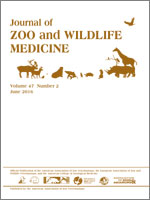A wild-raised, 5.0-kg male American white pelican (Pelecanus erythrorhynchos) of unknown age presented for routine examination at both the start and completion of a 30-day quarantine period at a zoological park. Upon physical examination, the pelican was bright, alert, and responsive and in good body condition. Two complete blood counts and a plasma biochemistry did not reveal any clinically significant abnormalities. Whole-body radiographs were unremarkable. Two fecal flotations (28 days apart) confirmed the presence of ascarid-type eggs. Fenbendazole anthelmintic was prescribed (50 mg/kg p.o. s.i.d. for 5 days). The pelican became lethargic and inappetent on day 3 of fenbendazole treatment and was found dead on day 7. Postmortem examination and histopathology revealed intestinal crypt cell necrosis, stomatitis, and splenic lymphoid depletion consistent with fenbendazole toxicity. To the authors' knowledge, this is the first report to describe fenbendazole toxicity in an American white pelican.
How to translate text using browser tools
1 June 2016
SUSPECTED FENBENDAZOLE TOXICITY IN AN AMERICAN WHITE PELICAN (PELECANUS ERYTHRORHYNCHOS)
Dana M. Lindemann,
David Eshar,
Jerome C. Nietfeld,
In Joong Kim
ACCESS THE FULL ARTICLE
American white pelican
benzimidazole
crypt cell necrosis
fenbendazole
Pelecanus erythrorhynchos
toxicity





